Download for Free | Webpower's In-Depth White Paper on WeChat Ecosystem Marketing for Luxury Brands Released
2022 was another challenging year for offline retail. Beyond the long-standing narrative of "e-commerce impacting offline stores," the effects of the pandemic further exacerbated the downturn, intensifying fears within the retail industry. Amidst these turbulent times, high-value luxury brands stood out, with sales not declining but rather increasing.
According to the Hermès Q1 2022 earnings report, as of the first quarter of 2022, Hermès revenue grew by 33% to €2.765 billion. Despite the recurring impact of the pandemic, the Asia-Pacific market, excluding Japan, still saw an impressive growth of 28%.
LVMH also released its Q1 financial report, which showed a revenue increase of 23% to €18 billion in the first quarter. In terms of regional performance, the Asia-Pacific market, excluding Japan, saw a growth of approximately 8%, with the Chinese market remaining particularly promising for the brand.


Why were high-priced luxury goods able to defy the trend and break through in the Chinese market amid the overall turbulence in the retail industry? Many industry experts suggest this may be related to luxury brands increasingly valuing online marketing.
Data shows that the offline consumption of luxury goods in China increased from 32% to 59%, while the share of purely online luxury purchases rose from 11% to 30%, more than doubling!
A Deloitte report suggests that this growth is due to new trends such as digitalization, sustainability demand, circular economy, and NFTs with fashion gaming, demonstrating a certain level of adaptability within the industry. Particularly important among these is that "digitalization is increasingly becoming a driving force for fashion tech investments in the luxury goods industry."
So, how can luxury goods leverage "digitalization" as a powerful marketing tool in their online marketing efforts? High-end retail brands can draw lessons from several aspects?
This year, Webpower collaborated with 1UP to survey 94 international luxury brands, gaining insights into their online WeChat ecosystem marketing strategies. These included renowned luxury brands such as Cartier, Givenchy, and Valentino.
To unlock the WeChat ecosystem marketing strategies for luxury retail ahead of time, click the image below to download the full white paper for free:

1.Seamless Customer Experience through the WeChat Ecosystem
For a long time, offline retail has been a major source of traffic, but it has also brought challenges to brand management. Due to the barriers of distance and the dispersed nature of in-store touchpoints, achieving higher-quality traffic has been difficult.
At the same time, customer service is crucial for luxury goods, thus, the value chain provided by the WeChat ecosystem has become an important factor in promoting the seamless connection between online and offline services for luxury brands.
Among these, the creative use of the WeChat Store and Mini Programs is a preferred marketing strategy for luxury brands.
The survey found that 80% of luxury and fashion brands have Mini Programs with shopping functions, and 28% of brands have developed Mini Programs with omni-channel integration features.
For instance, the fashion apparel brand Ralph Lauren enables consumers to conveniently participate in offline activities/services through Mini Programs, including coffee ordering, AI try-ons, product recommendations, and online ordering with in-store pickup. This allows users to enjoy services without leaving their homes, further expanding the consumption scenarios.

Simultaneously, the WeChat ecosystem is continuously enriching its feature matrix suitable for luxury brand marketing, such as creating premium brand zones.
Research shows that currently, 99% of renowned brands have developed premium brand zones on WeChat. These targeted features and marketing pathways are more effective in attracting high-net-worth customers online, facilitating online transactions.
93% of brands have launched their Video Channels on WeChat to align with the short video trend. For instance, Cartier and Van Cleef & Arpels have both activated their Video Channels. Cartier even held its first live streaming event recently during Qixi Festival, which received positive feedback. ``
To further unlock the WeChat ecosystem marketing strategies for luxury retail and see more luxury brand marketing case studies, click the image below to download the full white paper for free: ``

2. WeChat Connects with SCRM Membership Center
Currently, connecting WeChat to SCRM systems is a significant trend. Research shows that 30% of luxury brands have seamlessly integrated their Mini Programs with SCRM systems.
Through a series of online touchpoints for traffic generation, lawful tracking and collection of behavior data, integration with SCRM's unique marketing automation systems, in-depth insights supported by data middle platforms, and intelligent segmentation through scoring systems, brands can manage customers personally and carry out differentiated precision marketing. This systematic incubation will significantly enhance user lifecycle and unlock the long-term value potential of customers.
For example, Cartier is committed to providing consumers with visualized custom recommendations, offering detailed gift selection guides for different scenarios, and providing differentiated services in packaging, customization, and delivery.
To further understand the SCRM operational strategies for luxury retail and see more luxury brand marketing case studies, click the image below to download the full white paper for free:

3. Future Trends
Lastly, we reveal the marketing trends for luxury brands over the next three years in the white paper for everyone's reference:
- AR/VR
In the luxury industry, AR and VR are reaching a peak in application. Various categories are eager to try, using visualized scene re-creation to help users overcome the limitations of shopping spaces.
- 1-on-1 Video Chat
Real-time video interaction is an upgraded premium version of traditional online customer service. It brings the unique 1-on-1 service advantages of offline luxury shopping to the online world through technological means, creating an online shopping experience comparable to that of in-store.
- Online Pre-orders
Customers can place online pre-orders to be the first to buy the latest items from the runway. Brands can also use quicker and more digital methods to collect VIP customer orders.
- NFT Tokens
Due to the rising popularity of the metaverse, some luxury brands have started exploring the new trend of NFT digital collectibles. By integrating technological trends into retail, this approach can extend more possibilities for event operations.
To access the full white paper, click the image below to download it for free:

About Webpower
Webpower was founded in 1999 in the Netherlands and entered the Chinese market in 2006. Currently, it operates through 11 branches worldwide. As an omnichannel intelligent membership marketing service provider, Webpower has spent over a decade deeply rooted in China's market, consistently addressing the multifaceted marketing needs of enterprises by delivering innovative, cutting-edge, and effective marketing products and services.
In 2018, Webpower launched the "Smart Marketing" system, designed to create a complete marketing lifecycle for enterprises. This encompasses omnichannel data integration, marketing automation, multidimensional data analysis, as well as scenario-based applications and custom development.
Webpower now provides professional marketing services to 10 major industries, including retail, IT, tourism, aviation, exhibitions, and finance. Some of the globally renowned companies they have worked with include: Starbucks, SONY, Walmart, GIVENCHY, Rémy Martin, Lenovo, Disney, China Eastern Airlines, DBS Bank, and Pacific Insurance. ``
Adhering to the concept of "smart marketing," Webpower's goal is to: drive marketing with technology, deeply explore customer value for enterprises, and help them create a "smart marketing" landscape, extending the limitless imagination of digital marketing.
Webpower Rights Statement
Webpower China Region All Rights Reserved. Reproduction must include the source.



